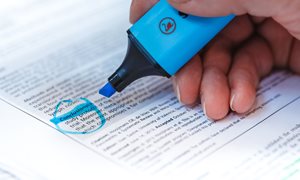Keeping on track
Training and supervision


Keeping on track
You have probably realized that time passes surprisingly quickly when doing your PhD. We recommend that you think about your progress and objectives for the coming year. This will help you keep on track.
read moreKeeping on track
Important questions
- Is your PhD progressing as you had expected?
- How would you assess the interaction and communication between yourself and your (co)supervisor(s)?
In light of these two questions, the following example points may be raised
- Reflection on expectations from the PhD project and from the supervisor(s)
- Reflection on end-of-year assessment [jaargesprek] with supervisor
- Reflection on personal ambition & interests
- Combination work and personal life
- Future career plans
- Reflection on achievements in last year
- Reflection on personal strengths and weaknesses (knowledge gaps, specific interests)
- Elective courses and workshops followed to date. Outcome & relevance e.g. in the light of improving weaknesses, technical expertise, future plans etc
- Reflection on Timeline for writing thesis: thesis chapter ideas > chapter titles > start writing.
- Foreseen difficulties
These topics can be discussed during the annual checkpoint meetings that are planned in Hora Finita.
Hora Finita
Overview PhD trajectories
The Radboudumc Graduate School and Donders Graduate School have slightly different trajectories and procedures.
- Radboudumc Graduate School: see trajectory in the interactive image below (expand using the button at the bottom right) Note: will be updated accordingly to merger of institutes soon
- Donders Graduate School: see trajectory on website Radboud University
FAQ about Hora Finita
If you have any questions about Hora Finita, please check out the answers to frequently asked questions before contacting us.
read moreFAQ about Hora Finita
For additional questions about Hora Finita, please contact Hora Finita or your Graduate School (Radboudumc Graduate School or Donders Graduate School).
This FAQ is divided into the topics 'General', 'PhD Checklist', 'Checkpoints', 'Training activities (portfolio)' and 'Manuscript'.
-
What is Hora Finita?
Hora Finita is the PhD project monitoring system of Radboud University and Radboudumc. With Hora Finita Radboud University and Radboudumc have an all-in-one system for the monitoring of all PhD projects. More information can be found on this page of the Radboud University's website.Who is considered a PhD candidate of Radboudumc?
Every researcher in a PhD project under the supervision of a Radboud university medical center professor, is a Radboud university medical center PhD candidate.What is the link to Hora Finita?
The URL is https://horafinita.ru.nlIs registration in Hora Finita necessary?
For all PhD trajectories Hora Finita must be used, according to the Doctorate regulations. This is because all steps in the PhD process, e.g. registration, Training and Supervision Plan (TSP), submission and review of manuscript, are performed exclusively through Hora Finita. Logging in into Hora Finita is done via SURFconext and is only possible with a Radboudumc (or RU) account.Why can't I login into Hora Finita?
Logging in into Hora Finita is done via SURFconext and is only possible with a Radboudumc (or RU) account.Therefore it is important that all PhD candidates (regular PhD candidates, external PhD candidates, Radboudumc employees starting a PhD trajectory) are registered with HR in time. More information about registration of different types of PhD candidates can be found here.
If the PhD trajectory is not completed within the contract period, action should be taken so that access to Hora Finita and associated Radboudumc facilities remains possible. More information can be found here.
If you are unable to login, even though you have a Radboudumc account, please contact horafinita@radboudumc.nl.
Where can I find Hora Finita manuals?
There is an extensive set of manuals available in Dutch and in English for both PhD candidates and supervisors.For additional questions about Hora Finita, please contact Hora Finita or your Graduate School (Radboudumc Graduate School or Donders Graduate School).
-
How can I agree to the Academic Integrity Code?
If you click on the link behind the "Academic Integrity Code" in the checklist you can read the code and check that you agree.I attended all required courses but the “required courses” are not ticked off in the PhD checklist on my dashboard
You must add all activities, including the required courses, to your portfolio yourself. You can do this for required courses through the tab "required courses". For all activities this can be done via "training activities". For more information please check the manual (ENG, NL).“Required course are completed” on your PhD checklist will only be ticked off when you select these courses via the tab “required courses”, or select these courses from the course list that is already available in Hora Finita. If you added a required course and its details yourself, please delete the course and add it again via the above mentioned procedure.
My TSP has been approved before but “TSP has been approved” is not ticked off or the date is not correct
Please contact your Graduate School (Radboudumc Graduate School or Donders Graduate School). -
What are checkpoints and where can I find more information?
Checkpoints are moments of supervision used to monitor and evaluate the progress of a PhD candidate's PhD project during the research phase.For more information about the checkpoints please check the interactive infographic of the Radboudumc PhD trajectory on our website. More information about the PhD trajectory of the Donders Graduate School can be found here.
Six weeks before the checkpoint date you will receive an automatic email announcing the checkpoint. In this email and on the checkpoint page is described what is expected of you.
When is a checkpoint created?
After the PhD candidate’s registration has been approved, Hora Finita automatically creates checkpoints. A new checkpoint will appear on your dashboard 6 months before the checkpoint date. Six weeks before the checkpoint date you will receive an automatic email announcing the checkpoint. Checkpoints are automatically created until the first supervisor ("promotor") approves the manuscript.Is a checkpoint meeting the same as my annual appraisal interview ("jaargesprek")?
The checkpoint (annual review) meeting is different from your annual appraisal interview, but you may choose to combine the two. In that case, please cover both the topics of the Hora Finita annual review questionnaire and the topics of the Radboudumc annual appraisal interview. Afterwards you have to submit both the annual review questionnaire (via Hora Finita) and the report of the annual appraisal interview (via email to "Postbus Personeelsdossier").Please note that for Checkpoint 2 and 3 (1 and 2 years after start PhD trajectory) it is advised to have an external advisor present at the checkpoint meeting.
Who should approve a checkpoint in Hora Finita?
Checkpoints should only be approved by the daily supervisor(s) of the PhD candidate. After the PhD candidate submits the Checkpoint, the daily supervisor automatically receives a request to approve the Checkpoint. The mentor has no role in the approval procedure.The Training and Supervision Plan (TSP) should be approved by the daily supervisor(s), the first supervisor ("eerste promotor") and the Graduate School.
-
How and when do I add activities to my PhD portfolio?
You must add all activities, including the required courses, to your portfolio yourself. You can do this for required courses through the tab "required courses". For all activities this can be done via "training activities". For more information please check the manual (ENG, NL).Annually, if you have a checkpoint, you will be asked to add the activities you did during the past year to your training activities (portfolio) in Hora Finita. Of course, you can also add an activity immediately after you've completed it.
Please note that for PhD candidates affiliated to the Radboudumc Graduate Shool it is not necessary to upload proofs of attendance.
I attended a required course but the course is not present in my portfolio
You must add all activities, including the required courses, to your portfolio yourself. You can do this for required courses through the tab "required courses". For all activities this can be done via "training activities". For more information please check the manual (ENG, NL).Please note that for PhD candidates affiliated to the Radboudumc Graduate Shool it is not necessary to upload proofs of attendance.
When do I have to complete my portfolio and submit it to my Graduate School for approval?
After your manuscript has been approved by your first supervisor (“promotor”) you will receive a request to complete your portfolio and submit it to your Graduate School for approval.Please note that for PhD candidates affiliated to the Radboudumc Graduate Shool it is not necessary to upload proofs of attendance.
Your Graduate School will decide whether you have completed all the necessary components of your institute’s PhD program in order to be awarded with your Graduate School’s education certificate. You will be informed of this decision in due course. The Graduate School will also provide you with a Word document of your final portfolio, which can be added to your PhD thesis.
-
How do I, as supervisor, perform a plagiarism check?
Indeed, according to the Doctorate regulations, the supervisor must check the PhD thesis for plagiarism. For this purpose, a similarity report, generated by the program iThenticate by colleagues at Radboud University, will be sent to the promotor via e-mail. Questions about the working method or the program can be sent to Hora Finita or the RU helpdesk. There are also several short manuals available on RadboudNet that explain how to use the program.
Courses for competencies
Core competencies for PhD candidates and postdocs
Radboudumc has defined a set of core competencies for PhD and postdoc candidates as a guideline for professional career development.
read moreCore competencies for PhD candidates and postdocs
During their training, PhD and postdoc candidates are expected to become independent researchers skilled in (financial) project management, policy/decision making and management. These types of transferable skills stand candidates in good stead not just for an academic career but also for the professional job market beyond the university setting.
Self-assessment tool
Collectively the university medical centres designed a competence model as a self-assessment tool to help you further develop yourself, and to recognize acquired competences.
PhD Compentence Model: Link
Types of core competencies
- Research skills and knowledge
- Responsible conduct of science
- Personal effectiveness
- Professional development
- Leadership and management
- Communication
- Teaching
- Radboud specific
For each type of compencies we offer a number of courses if you feel that you use some extra training to enhance these skills.
Scientific integrity
Contact persons
Radboudumc has appointed three experienced scientists, as contact persons in the case of suspicion of scientific misconduct or related matters.
PhD mentor
PhD mentor a quick guide
The mentor is appointed at Radboudumc, has ample experience in PhD supervision and is an assistant, associate or full professor or a medical specialist with research experience. The mentor should not work in the same department as the PhD candidate and the supervisors and is not involved in the PhD project.
read morePhD mentor a quick guide
The mentor will support and guide you as well as stimulate you to critically look at and reflect upon your learning objectives and outcomes. In the context of your personal and scientific development, your mentor should discuss career progress with regard to your specific goals (research and education), ambitions and interests. Your mentor can advise you regarding your choices for elective subjects and where necessary offer feedback on research project results, conclusions and ideas. Confidentiality will be maintained at all times.
Also see institute specific information in the time line.
Specific for PhD candidates of the Radboudumc Graduate School
Tasks of the mentor
- Read the Training and Supervision Plan (TSP) at the start of the project, and comment on it if necessary at the first meeting between the candidate and the mentor.
- Have a meeting with the PhD candidate once a year to discuss the progress of the project, both in terms of scientific output, as well as training (competences and skills).
- Be available throughout the year for independent advice.
Confidentiality will be maintained at all times.
Guidelines for PhD mentor meetings
Every year, the PhD candidate needs to arrange a progress meeting with his/her mentor. Progress and scientific output are discussed. The attendance of the PhD training program components will also be assessed.
Although the content of the meetings will depend on the candidate's needs, several subjects need to be discussed in the meetings. This will help the PhD candidate to make the right choices in his/her individual program.
Important questions during mentor meeting
- Is your PhD progressing as you had expected?
- How would you assess the interaction and communication between yourself and your (co)supervisor(s)?
In light of these two questions, the following example points may be raised
- Reflection on expectations from the PhD project and from the supervisor(s)
- Reflection on end-of-year assessment [jaargesprek] with supervisor
- Reflection on personal ambition & interests
- Combination work and personal life
- Future career plans
- Reflection on achievements in last year
- Reflection on personal strengths and weaknesses (knowledge gaps, specific interests)
- Elective courses and workshops followed to date. Outcome & relevance e.g. in the light of improving weaknesses, technical expertise, future plans etc
- Reflection on Timeline for writing thesis: thesis chapter ideas > chapter titles > start writing.
- Foreseen difficulties

